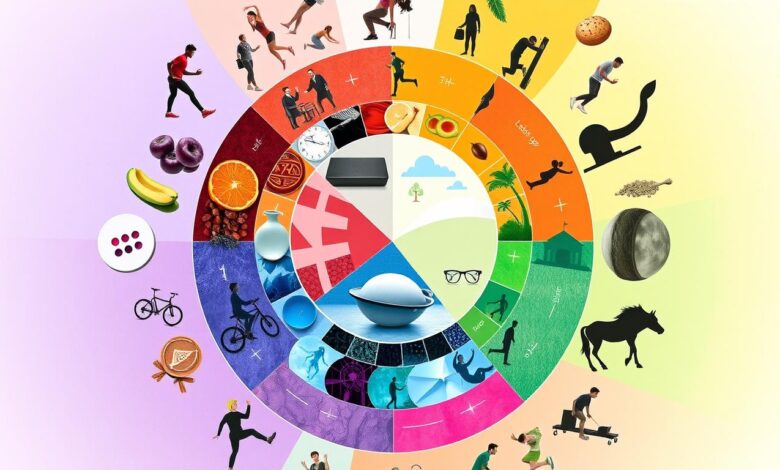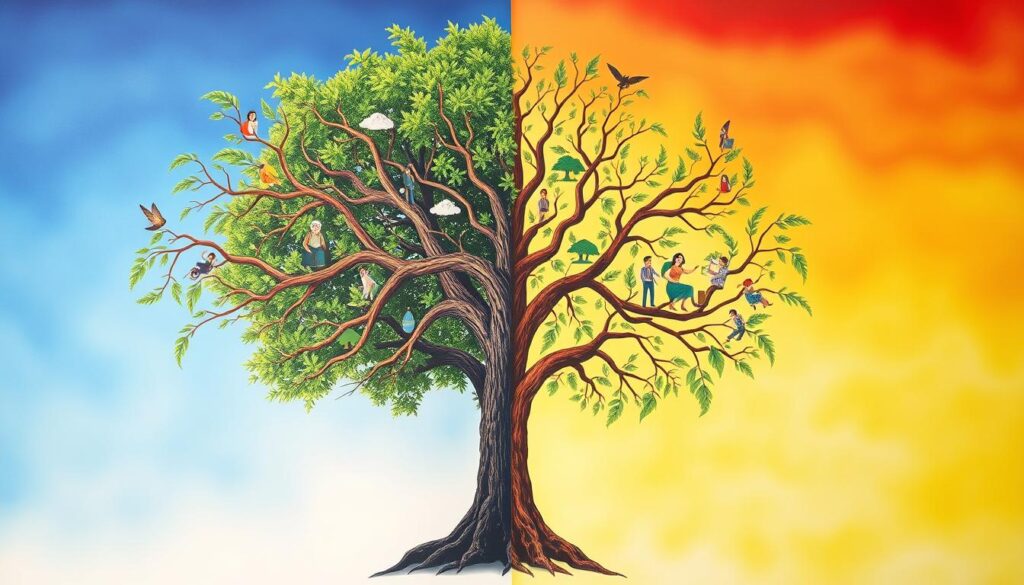lifestyle cycles

As you move through life’s stages, it’s key to grasp lifestyle cycles. These cycles cover the different phases and changes that shape your growth, habits, and daily life. Understanding and embracing these cycles can help you live a more balanced and fulfilling life.
Life’s journey includes early development, adulthood, and retirement, each with its own challenges and opportunities. Knowing about these life cycles helps you prepare for and adapt to changes. This way, you can make better choices and live a more meaningful life.
Whether starting a new education, moving towards financial freedom, or dealing with family life, lifestyle cycles offer valuable insights. This knowledge helps you navigate your personal and professional life better. It leads to a more purposeful and rewarding existence.
Table of Contents
Understanding the Fundamentals of Lifestyle Cycles
Exploring the different lifestyle stages in our lives is both fascinating and complex. From a life course perspective, we delve into the core elements of human development cycles. We also uncover the science behind life’s transitions. By grasping the complex mix of biological and social factors, we can better understand our personal growth and adaptability.
Key Components of Life Stage Development
The lifestyle stages we go through are influenced by many factors. These include physical, cognitive, emotional, and social changes. As we move through these stages, we face unique challenges and opportunities. This helps shape our overall development and well-being.
Understanding each life stage can prepare us for and help us manage life’s transitions.
The Science Behind Life Transitions
The life course perspectives are rooted in scientific principles. These principles include neurological and hormonal changes, as well as societal norms and cultural influences. This complex mix shapes our experiences and personal growth.
Knowing the science behind life transitions can help us navigate these critical moments with more awareness and resilience.
Biological vs. Social Life Cycles
It’s crucial to see the difference between biological and social life cycles. Biological factors, like physical growth and aging, follow a predictable path. On the other hand, social life cycles are shaped by cultural expectations, personal choices, and environmental factors.
Understanding these differences helps us align our personal goals with the realities of our life course perspectives.
| Life Stage | Biological Changes | Social Transitions |
|---|---|---|
| Early Childhood | Physical growth, cognitive development | Socialization, early education |
| Adolescence | Puberty, hormonal changes | Independence, identity formation |
| Adulthood | Physical and reproductive maturity | Career development, relationships, parenthood |
| Older Adulthood | Aging, health changes | Retirement, grandparenthood, leisure |
“Understanding the intricate dance between our biological and social life cycles is the key to navigating the remarkable journey of human development cycles.”
Early Life Development and Formation Years
The early years of life are key for personal growth. During this time, people go through big age-related changes and developmental stages. These shape their future lifestyle cycles.
From birth to being a teenager, kids go through a lot. They start to move, talk, and feel emotions. These skills help them grow up and be independent.
As kids get older, they learn to solve problems and think abstractly. They also start making decisions. These skills are important for their future.
Kids also grow socially and emotionally. They learn to connect with others, feel empathy, and find who they are. These skills help them make friends and deal with life’s ups and downs.
It’s important for parents, teachers, and doctors to support kids during this time. Knowing about age-related changes and developmental stages helps them grow strong. This way, kids can face life’s challenges with confidence.
“The first few years of a child’s life are the foundation upon which the rest of their life is built.” – Dr. J. Lawrence Aber, Child Development Expert
| Developmental Stage | Key Characteristics |
|---|---|
| Infancy (0-2 years) | Rapid physical growth, sensory and motor skill development, emergence of language and communication |
| Early Childhood (3-6 years) | Increased cognitive abilities, social-emotional development, independence and self-care skills |
| Middle Childhood (7-11 years) | Continued cognitive growth, expansion of social relationships, development of hobbies and interests |
| Adolescence (12-18 years) | Hormonal changes, formation of personal identity, increased independence and decision-making |
The Transition from Youth to Adult Independence
The journey from youth to adulthood is a big change. It involves making important decisions and becoming independent. You’ll choose your education and career, manage money, and find who you are.
Educational and Career Pathway Decisions
Choosing your education and career is a big decision. It affects your future and happiness. Think about what you’re good at and what you want to do.
Building Financial Independence
Getting financially independent is key during this time. You’ll learn to manage money, find a job, and handle your expenses. These skills help you be secure and independent.
Establishing Personal Identity
This phase also lets you discover who you are. You’ll find your values, interests, and passions. You’ll make friends and try new things. This journey helps you find your way.

“The transition to adulthood is not just about achieving independence; it’s about finding your unique place in the world.”
Growing up is a journey full of challenges and chances. You’ll make big choices, become financially stable, and find your identity. Embracing this time sets you up for a happy and independent adulthood.
Professional Growth and Career Evolution
As you move through the lifestyle cycles, your career is key to your well-being. The life events in your career can greatly affect your personal and financial life.
Professional growth has its ups and downs. You need to be flexible, plan ahead, and be open to new challenges. Every step, from learning new things to advancing in your career, brings chances for growth.
Embracing Career Transitions
Throughout your life events and lifestyle cycles, you’ll face many career changes. These can be job shifts, moving to a new industry, or starting your own business. Seeing these changes as opportunities can help you reach your full potential.
- Develop skills that many employers value
- Look for chances to learn from others
- Build a wide network to find new career paths
Navigating Work-Life Balance
As your life events and lifestyle cycles change, finding a good work-life balance is crucial. This balance is important for your happiness and success in both your job and personal life.
- Make time for self-care and wellness
- Set clear limits and goals
- Look into flexible work options or remote jobs
By accepting the ups and downs of your career, you can handle them better. This approach can improve your life overall.
“Your career is not just a job – it’s a journey of self-discovery and growth.”
Family Formation and Relationship Dynamics
Life changes a lot as we go through different stages. When we start a family, our roles and relationships change. Finding a good balance between work and family is key.
Partnership and Marriage Stages
Going from being single to married is a big change. It brings excitement and challenges. Understanding these stages helps us adjust to our new life together.
Parenting Transitions
Having kids changes everything. Parents must balance their family life with their own goals. Finding a good work-life balance is crucial.
Work-Life Balance Strategies
- Prioritizing self-care and personal well-being
- Establishing clear boundaries between work and home life
- Delegating and sharing responsibilities with a partner or support network
- Exploring flexible work arrangements or remote work opportunities
- Practicing mindfulness and stress management techniques
Understanding life’s phases helps us manage family and work better. It makes our lives richer and more fulfilling.
Mid-Life Transitions and Lifestyle Adjustments
As we journey through life, mid-life brings its own set of challenges and chances. This stage is filled with changes and big life shifts that deeply affect our lifestyle and well-being.
Mid-life often makes us rethink our careers. Many look for new paths to grow and find happiness. It’s a time to discover new passions and values through work or starting our own businesses.
Mid-life also makes us think deeply about our personal lives. We might relook at our relationships, our roles in the family, and what gives our life meaning. These changes lead to lifestyle shifts as we aim for a better balance between work and life, and cherish our connections.
Moreover, mid-life is when we face health issues head-on. We start to manage chronic conditions and take steps to stay healthy. This phase encourages us to focus on our health, helping us deal with life’s ups and downs with strength and energy.
In the end, mid-life is a chance for personal growth and finding our true selves. By accepting the age-related changes and navigating life’s twists, we can create a more rewarding and balanced life. This sets the stage for a fulfilling second half of our lives.

“The middle years of life are a time of great change and opportunity. It’s a chance to reevaluate, reinvent, and reinvigorate our lives.” – Anonymous
Later Adult Years and Retirement Planning
As you get closer to retirement, planning for it is key. This time lets you explore new passions, stay healthy, and find purpose. It’s a chance to make the most of your golden years.
Financial Preparation for Retirement
Securing your finances in retirement is vital. First, check your savings, investments, and income. Create a detailed plan that includes Social Security, pensions, and your savings. A financial advisor can help you make the most of your money.
Health and Wellness Considerations
Good health is crucial in retirement. Make sure to get regular check-ups and care. Also, keep an active lifestyle by joining clubs, trying new hobbies, or volunteering.
Leisure and Purpose in Later Life
Retirement is a time to follow your dreams and find joy. Make a bucket list and try new things like hobbies or travel. Keep strong relationships and stay connected with friends and family.
With good planning, you can enjoy your later years with confidence and purpose. It’s a time to live life to the fullest.
“Retirement is not the end of the road; it is the beginning of the open highway.” – Unknown
Managing Life’s Major Milestones and Changes
Life is a journey with both expected milestones and surprises. It includes career changes and family shifts. Understanding these changes is key for growth and happiness. This part talks about how to handle big life events, building strength and flexibility.
Being flexible and open to new things is important. Some events, like getting married, are planned. But others, like losing a loved one, are not. By being proactive and finding ways to cope, you can get through tough times stronger.
Having a strong support network is also crucial. Friends, family, or mentors can offer emotional and practical help. Regular self-reflection and honest talks with loved ones can show where you need more help or advice.
Also, keeping your body and mind healthy is key. Activities like meditation or exercise can help with stress. Being financially smart can also make unexpected changes easier.
Handling life’s big moments needs balance. It’s about being adaptable, having support, and taking care of yourself. With a proactive and all-around approach, you can not only get through but also grow during life’s most important times.
| Coping Strategies for Major Life Transitions | Benefits |
|---|---|
| Develop a growth mindset Cultivate a strong support network Prioritize self-care and wellness Seek professional guidance when needed Embrace flexibility and adaptability | Enhanced resilience and coping skills Emotional and practical support during challenges Improved physical and mental well-being Smoother navigation of life’s pivotal moments Increased ability to thrive during changes |
“The greatest weapon against stress is our ability to choose one thought over another.” – William James
Conclusion
Exploring lifestyle cycles shows us how important it is to understand life’s different stages. From the early years to adulthood and later life, each stage brings its own challenges and chances to grow.
Knowing about life stage development and the science behind life changes helps you adapt and succeed. It’s about making career choices, building wealth, and handling family and relationships. Embracing the details of lifestyle cycles can make your life more rewarding and balanced.
As you move through your lifestyle cycles and human development cycles, remember to adapt and grow. Paying attention to your life’s rhythms and seizing growth opportunities helps you understand yourself better. This leads to a more meaningful and fulfilling life.
FAQ
What are lifestyle cycles?
Lifestyle cycles are the different stages and changes we go through in life. They shape our personal growth, habits, and daily routines. These cycles include important milestones like education, career, relationships, and retirement. They greatly affect our well-being and happiness.
Why is it important to understand lifestyle cycles?
Knowing about the stages and changes in your lifestyle cycles is key. It helps you grow personally, adapt to new situations, and live a balanced life. By understanding these cycles, you can prepare for and handle the challenges and opportunities in different life phases.
What are the key components of life stage development?
Life stage development includes physical, cognitive, and social changes. These changes affect our behaviors, decisions, and well-being. They are closely tied to our lifestyle cycles.
How do biological and social life cycles differ?
Biological life cycles are driven by physical changes, like aging. Social life cycles are shaped by society, culture, and personal choices. Knowing how these cycles work together helps you navigate life’s changes better.
What are the critical developmental stages in early life?
Early life, from infancy to adolescence, is filled with important developmental stages. These stages set the foundation for your future, including education, career, and personal relationships.
How do educational and career decisions impact your lifestyle cycles?
Your education and career choices greatly affect your lifestyle cycles. They influence your financial status, identity, and future opportunities. These decisions shape your life journey.
What are the key considerations for building financial independence?
Financial independence is a big step from youth to adulthood. It involves smart budgeting, saving, investing, and managing debt. These actions greatly impact your lifestyle cycles and long-term happiness.
How do partnerships and parenting transitions affect lifestyle cycles?
Relationships, marriage, and parenting bring new stages and challenges. They impact your lifestyle cycles. Managing work-life balance, personal growth, and family dynamics is crucial during these transitions.
What are the common challenges and opportunities in mid-life?
Mid-life brings unique challenges and opportunities, like career reassessment and personal growth. It also involves health considerations and lifestyle adjustments. Addressing these can help you stay balanced and adapt to life’s changes.
How can you prepare for the later adult years and retirement?
Planning for later years and retirement is key. It involves financial preparation, health maintenance, and finding purpose and leisure activities. This ensures a fulfilling life during this phase.
What strategies can help you manage major life milestones and changes?
Managing big life events and changes requires adaptability and resilience. Developing strategies for adapting, growing personally, and maintaining balance helps you navigate lifestyle cycles successfully.

